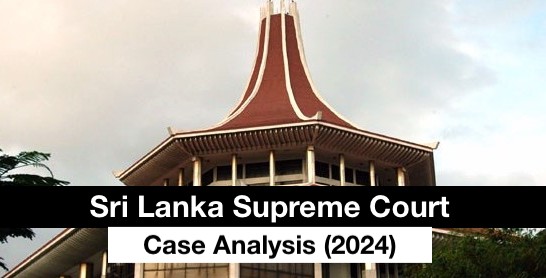Case Overview:
This case SC CHC Appeal No. 32/2008 involves an appeal by Nallathamby Chandra (3rd Defendant-Appellant) and Nallathamby Kumarachandran (2nd Defendant-Appellant) against the judgment of the Commercial High Court of Colombo, which ruled in favor of the Merchant Bank of Sri Lanka PLC (Plaintiff-Respondent). The case revolves around a default on a Bill Discounting Facility and associated Mortgage Bonds, with the Plaintiff-Bank seeking to recover a sum of Rs. 8,307,207.19 plus interest.
Key Issues Raised:
- Validity of Mortgage Bonds and Obligations under Tesawalamai Law:
- The 3rd Defendant-Appellant argued the mortgage bonds lacked legal validity as her husband’s consent was not obtained, citing Tesawalamai law.
- Non-Payment of Dues:
- The Plaintiff-Respondent alleged default on the repayment of the bill discounting facility by the defendants.
- Procedural Objections:
- Defendants raised issues of misjoinder of parties, causes of action, and non-presentation of the bill under the Bills of Exchange Ordinance.
Judicial Findings:
- Legal Validity of the Mortgage Bonds:
- The Court ruled that the bonds were executed under a valid Power of Attorney, making the 3rd Defendant’s argument about Tesawalamai law irrelevant.
- The 3rd Defendant failed to provide sufficient evidence to support her claims.
- Admittance of Debt and Default:
- The 2nd Defendant admitted to obtaining the facility and defaulting on payment. The 3rd Defendant’s obligation, as a guarantor, was affirmed.
- Procedural Integrity:
- The Court dismissed objections about misjoinder and non-presentation of the bill, stating these issues were raised too late and lacked merit.
Court’s Reasoning:
- Admission of Debt:
- Evidence, including signed agreements and admissions during cross-examination, confirmed the defendants’ liability for the debt.
- Lack of Evidence for Tesawalamai Claim:
- The 3rd Defendant did not substantiate her claim that her obligations were invalid under Tesawalamai law.
- Procedural Objections:
- The Court emphasized that procedural issues should have been raised during trial, not at the appeal stage.
- Interconnected Nature of Claims:
- The misjoinder objection was rejected as the claims against the defendants stemmed from a common transactional background.
Judgment
The Supreme Court upheld the decision of the Commercial High Court, affirming the defendants’ liability to repay the Plaintiff-Bank. Both appeals were dismissed with costs fixed at Rs. 150,000.
Key Takeaways
- Responsibility under Financial Agreements:
- Borrowers and guarantors are jointly and severally liable for repayment unless valid defenses are substantiated.
- Procedural Discipline in Litigation:
- Procedural objections must be raised at the earliest opportunity during trial.
- Burden of Proof:
- Parties citing legal protections (e.g., Tesawalamai law) must provide concrete evidence to support their claims.
Implications:
This case underscores the importance of adhering to financial and procedural obligations in commercial transactions. It also highlights the courts’ reluctance to entertain procedural objections raised for the first time at the appellate stage.
Download Full Judgment














